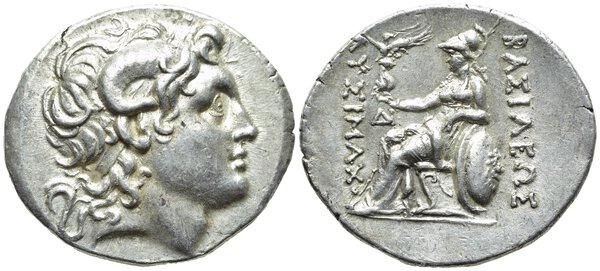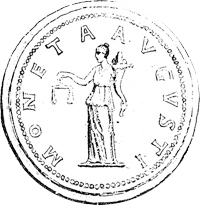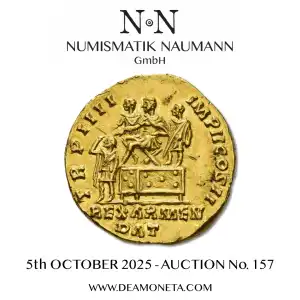



KINGS OF THRACE (Macedonian). Lysimachos (305-281 BC). Tetradrachm. Amphipolis.
Obv: Diademed head of the deified Alexander right, wearing horn of Ammon.
Rev: BAΣΙΛΕΩΣ / ΛYΣIMAXOY.
Athena seated left on throne, holding crowning Nike and spear over shoulder, and resting elbow on shield. Control: ΔI monogram to inner left.
Thompson 213 var. (monogram to outer right); Müller 212 var. (same); HGC 3.2, 1750l.
Lysimachos was a Macedonian general and one of Alexander the Great's Diadochi. He was the son of Agathokles, from an important family in Pella. Took part in Alexander's expedition to Asia and distinguished himself during the campaign in India. As a reward for his valor, Alexander presented him with a golden crown in Susa. When Alexander died in 323, during the division of the empire's satrapies in Babylon, Lysimachos obtained Thrace and worked to expand its borders to the mouth of the Danube. He formed an alliance with Seleukos, Kassander, and Ptolemy against Antigonos, who had revived the idea, already supported by Perdikkas and Eumenes, of reconstituting the unity of Alexander's empire under his command. Antigonos sought to use the Greeks' desire for freedom to his advantage, proclaiming that all Hellenic states should be independent and free from garrisons and tributes. This also had an effect in Thrace, where a revolt broke out against Lysimachos, who managed to defeat the rebels and the troops sent by Antigonos. The general peace that ended in 311 consolidated his rule in Thrace, where he founded the new capital, Lysimachia, in 309/8. However, peace was brief and various Diadochi took the title of king, including Lysimachus (in 306-5), who once again allied himself with the previous league against Antigonos in Asia Minor. Antigonos was defeated at Ipsos in Phrygia, and in the resulting partition, Lysimachos gained control of Lydia and Caria. In honor of his first wife, who had died, he changed the name of the city of Antigoneia, founded by his rival, to Nicaea. To strengthen his alliance with Egypt, he remarried Arisonoe II, daughter of Ptolemy. Later, when Demetrios Poliorketes, Antigonos' son, resumed his father's plans and proclaimed himself king of Macedonia, he fought against him with mixed fortunes. When Demetrios attempted to occupy Thrace, Lysimachos allied with Ptolemy, Seleukos, and Pyrrhus, king of Epirus. In 288 BC, the coalition invaded Macedonia, forcing Demetrios to flee. In the ensuing partition, Lysimachos took western Macedonia and Pyrrhus took eastern Macedonia. The alliance with Pyrrhus soon broke down; defeated by Lysimachos, he was forced to retreat to Epirus, while in 285 Lysimachos became king of the all of Macedonia. His increased power aroused the suspicions of Seleukos and Ptolemy, intertwining with a family tragedy. His wife Arsinoe (perhaps with the intention of securing succession for her children) accused her stepson Agathokles of plotting against his father to seize the throne; Lysimachos had him imprisoned and poisoned (284 BC). His widow Lysandra (Arsinoe's half-sister), his brother Alexander, and other figures close to Agathokles fled and took refuge at the court of Seleukos, prompting him to wage war against Lysimachos. In the war that followed, Lysimachos was defeated, partly due to defections among his own forces, and died on the battlefield at Corupedium in Phrygia (282 BC). He was between 74 and 80 years old. The Asian territories of his kingdom came under the control of Seleukos, while Macedonia and Thrace, after various events, passed to Antigonos Gonatas, son of Demetrios.
Condition: Near extremely fine.
Weight: 17.10 g.
Diameter: 31 mm.
Obv: Diademed head of the deified Alexander right, wearing horn of Ammon.
Rev: BAΣΙΛΕΩΣ / ΛYΣIMAXOY.
Athena seated left on throne, holding crowning Nike and spear over shoulder, and resting elbow on shield. Control: ΔI monogram to inner left.
Thompson 213 var. (monogram to outer right); Müller 212 var. (same); HGC 3.2, 1750l.
Lysimachos was a Macedonian general and one of Alexander the Great's Diadochi. He was the son of Agathokles, from an important family in Pella. Took part in Alexander's expedition to Asia and distinguished himself during the campaign in India. As a reward for his valor, Alexander presented him with a golden crown in Susa. When Alexander died in 323, during the division of the empire's satrapies in Babylon, Lysimachos obtained Thrace and worked to expand its borders to the mouth of the Danube. He formed an alliance with Seleukos, Kassander, and Ptolemy against Antigonos, who had revived the idea, already supported by Perdikkas and Eumenes, of reconstituting the unity of Alexander's empire under his command. Antigonos sought to use the Greeks' desire for freedom to his advantage, proclaiming that all Hellenic states should be independent and free from garrisons and tributes. This also had an effect in Thrace, where a revolt broke out against Lysimachos, who managed to defeat the rebels and the troops sent by Antigonos. The general peace that ended in 311 consolidated his rule in Thrace, where he founded the new capital, Lysimachia, in 309/8. However, peace was brief and various Diadochi took the title of king, including Lysimachus (in 306-5), who once again allied himself with the previous league against Antigonos in Asia Minor. Antigonos was defeated at Ipsos in Phrygia, and in the resulting partition, Lysimachos gained control of Lydia and Caria. In honor of his first wife, who had died, he changed the name of the city of Antigoneia, founded by his rival, to Nicaea. To strengthen his alliance with Egypt, he remarried Arisonoe II, daughter of Ptolemy. Later, when Demetrios Poliorketes, Antigonos' son, resumed his father's plans and proclaimed himself king of Macedonia, he fought against him with mixed fortunes. When Demetrios attempted to occupy Thrace, Lysimachos allied with Ptolemy, Seleukos, and Pyrrhus, king of Epirus. In 288 BC, the coalition invaded Macedonia, forcing Demetrios to flee. In the ensuing partition, Lysimachos took western Macedonia and Pyrrhus took eastern Macedonia. The alliance with Pyrrhus soon broke down; defeated by Lysimachos, he was forced to retreat to Epirus, while in 285 Lysimachos became king of the all of Macedonia. His increased power aroused the suspicions of Seleukos and Ptolemy, intertwining with a family tragedy. His wife Arsinoe (perhaps with the intention of securing succession for her children) accused her stepson Agathokles of plotting against his father to seize the throne; Lysimachos had him imprisoned and poisoned (284 BC). His widow Lysandra (Arsinoe's half-sister), his brother Alexander, and other figures close to Agathokles fled and took refuge at the court of Seleukos, prompting him to wage war against Lysimachos. In the war that followed, Lysimachos was defeated, partly due to defections among his own forces, and died on the battlefield at Corupedium in Phrygia (282 BC). He was between 74 and 80 years old. The Asian territories of his kingdom came under the control of Seleukos, while Macedonia and Thrace, after various events, passed to Antigonos Gonatas, son of Demetrios.
Condition: Near extremely fine.
Weight: 17.10 g.
Diameter: 31 mm.


